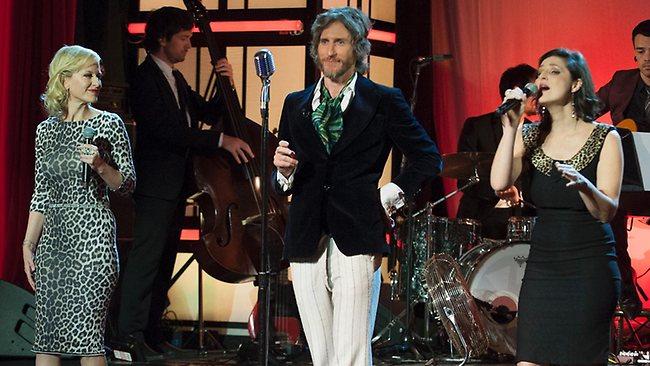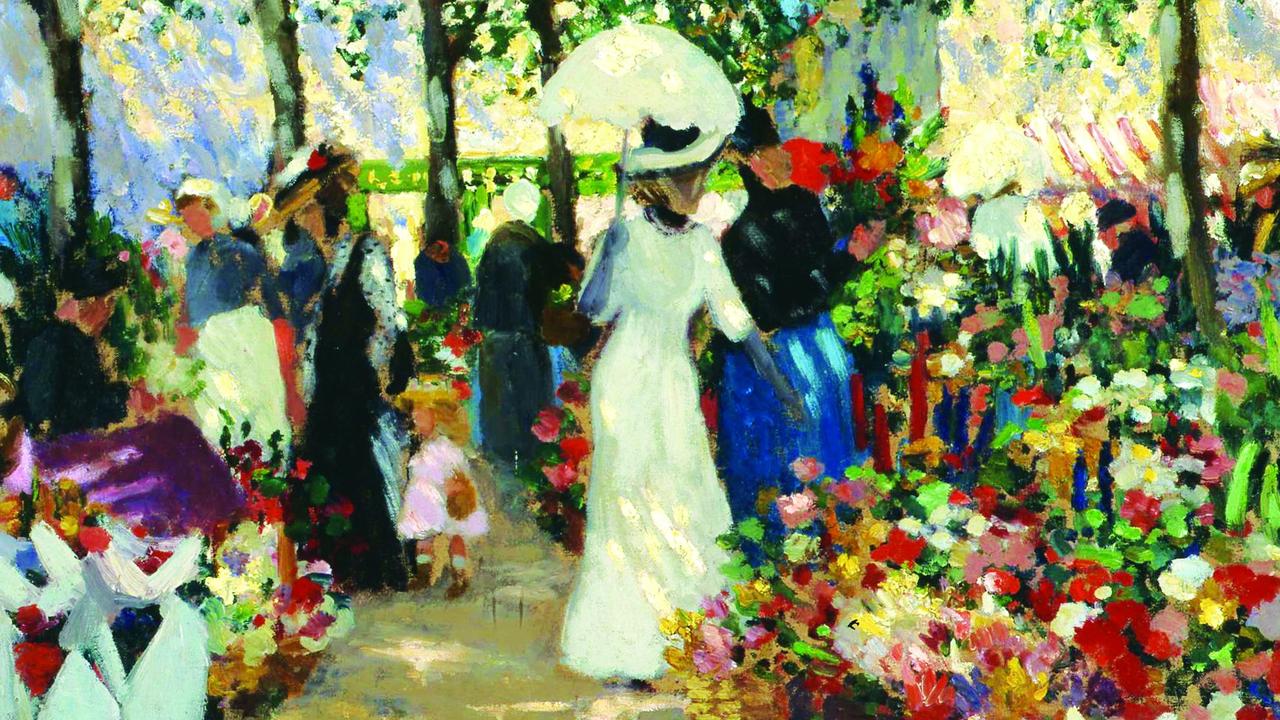Tim Rogers' baroque parade
ROCK star and debonair flaneur Tim Rogers hosts a musical variety show for the modern age.

ONCE, music was all over TV. In the beginning it was part of our nightly entertainment, with appealing, attractive performers let loose in our homes, idolised and gossiped about, the big, shiny ox-blood veneered TV box and its inmates becoming part of our families. Variety shows were everywhere.
As screens were drenched with rainstorms from seltzer bottles, deluges of confetti, banana skins and sight gags, this substitute universe of grinning comics, gibbering hosts and barrel girls, featuring an entertaining approach to live advertising, also included crooners, folkies, torch singers, rock bands and chanteuses. I can still recall vividly the great Irish tenor Bill McCormack who sang, nightly it seemed, for 10 years on Graham Kennedy's In Melbourne Tonight, 20 songs a month, 200 a year. McCormack survived through a habitual and cheerily unrepentant use of large white-sheeted cue cards. They said about him that he was the only performer who needed an idiot sheet to sing The Lord's Prayer.
Gradually the music died, Rove McManus's shows (how distant they seem already) the last time really that the songs of the day were sung on the small screen by our great artists -- though they do sometimes pop up on Adam Hills's self-effacing ABC series.
Yes, I know The Voice, Australian Idol, The X Factor and their like are watched by millions but they're little more than glorified karaoke shows, hybrid hotchpotches of game, talent, variety and ongoing reality series. Sure they're great fun, especially in the early episodes which, before the brutal winnowing process, celebrate diversity and a crazy cacophony of voices; the entire compass of tones representing thousands of kids singing alone in their bedrooms in search of their rock-star dream. But on free-to-air TV we seldom see our progressive rock stars, let alone the postmodernish cabaret artists and those neo-burlesque performers giving a contemporary spin to the bump-and-grind tradition.
Of course there's RocKwiz on SBS, the great survivor, now in its 11th season, an often transgressive display of rock nerdery, comedy, musical trivia and performances by some of the biggest names in the music business. It's still hosted by lusty, prancing Julia Zemiro and zany, hooting Brian Nankervis, and the show continues to speak its familiar idiosyncratic language. It happily provides a link to the vaudevillian early days of TV, when anything could happen and often did. The music, though, is no laughing matter, tight and concentrated, though the house musos, James Black, Peter Luscombe and Mark Ferrie, tough, hardened Melbourne pros, also love a gag and a bit of lairising.
RocKwiz is still recorded before an audience at the Gershwin Room at the Esplanade Hotel, aka the Espy, in Melbourne's St Kilda, a live music venue for more than 100 years. And there's a lovely mix in the edited show of lowbrow show business, sawdust-on-the-floor pub rock 'n' roll and clubland music quiz but also, so often, sheer musical class. This week's episode, for instance, showcases the charismatic Tim Rogers, frontman of the great rock band You Am I, reminding us just why he and his colleagues have had three successive albums debut at No 1 and won 10 ARIA awards since their inception in 1989.
Rogers also turns up as host of the Studio at the Memo this week, a six-part new performance series from Renegade, the same Melbourne production company that gives us the knock-about RocKwiz, and it's also filmed before an audience. In this case it's the legendary "hidden theatre" in the Memorial Hall, next to the St Kilda Army & Navy Club in Acland Street. It's an art deco 1920s dancehall neglected for decades but in recent years restored by the trust that owns it and now runs as a performance venue.
Rogers presents a flamboyant parade of our chart-topping artists and the latest in avant-garde burlesque, cabaret and circus on a small stepped stage with velvet curtains and some art deco trim. The line-up for the season includes eccentric theatre star Paul Capsis, chanteuse Martha Wainwright, indie darling Kate Miller-Heidke, Don Walker from Cold Chisel and the acrobatics of Circus Oz. And Rogers is joined onstage each episode by the Syndicate, led by musical director Lance Ferguson, the man behind the Bamboos, that fine local funk and soul outfit.
The first carnivalesque episode features the sexy French chic of Abby Dobson and Lara Goodridge as Baby et Lulu, accompanied by flautist Jane Rutter, the effervescent Virginia Gay doing her "turning pretty songs dirty and dirty songs pretty" shtick, and Todd McKenney ripping out some Peter Allen.
There's also pixie rocker Dave Graney, introduced by Rogers as "a Moodist who has caught his foot in the crack of time", and the Cruel Sea's Tex Perkins doing a kind of beat poet thing, gruffly and very comically reading the lyrics from Foreigner's hit song Urgent. It's an unexpected performance that, according to the host, excavates "the nuggets from the deepest, deepest shafts of lyrical interpretation", the comic floridity typical of his extravagant hosting style.
Rogers appears to us, he says, in the guise of a flaneur, that word understood intuitively by the French to mean "stroller", the gentlemanly idler mooching through life with no intention to buy, treating those he passes as objects for pleasure when they take his eye. Susan Sontag famously referred to the flaneur as "the solitary walker reconnoitring, stalking, cruising the urban inferno, the voyeuristic stroller who discovers the city as a landscape of voluptuous extremes".
And that's what Rogers seems to be looking for in his show, set as he says in the "crepuscular ambience of St Kilda", as he delights in watching and often participating with these lubricious (in the case, certainly, of Harlowesque Gay, and the svelte Dobson and Goodridge) and pleasing oh-so-haute performers. He tells us Hemingway once said there are only two places to live -- at home and in Paris -- and that it was in Paris over absinthe and crepes that Rogers decided to cast off his previous incarnation as a lugubrious overrated, young Indie guitarist and live the life of a bon vivant "in the refined search for sensuous enjoyment".
He really is an elegant dude of a performer, extravagantly coiffured, dressed in two-tone shoes, cream pants with a slight flare, tight velvet jacket over a soft white shirt and a long wispy scarf, with a sly, seductive charm as a host; you take him at his own word that he's always in charge, his self-confidence matching his self-delusion. Not all of what he does in presenting and chatting with his guests and a rather straitlaced audience works, but as far as he is concerned he is never beaten, always drolly cock-a-hoop.
Sometimes he flummoxes his interview subjects with his long Wildean questions, elegantly self-reverential, and can never grasp why they suddenly burst into laughter at the outrageousness of it all. There are agonies of bewilderment and frustration as he struggles through oddly poetic sentences, sometimes quoting Apollinaire and Robert Frost.
There's a look of wounded dignity when they raise a laugh, a sense of hurt pride in his eyes, saying more effectively than words that he has done his best. It's a wonderful act really. And can the man sing -- crooner, jazzman and full-on rocker -- with moves behind the microphone that, as Gay suggests, would make Mick Jagger envious. "We aim to charm you," he tells us of his show. "My hero Kurt Vonnegut defined charm as a scheme by which a stranger could make someone trust a person immediately, even before knowing the intent of the charmer."
There's no one else like him on TV and this show, like RocKwiz, should run for decades, especially as Foxtel has allocated a multi-million-dollar fund to record local performance. Rogers is seriously cool, in the sense that the word means calm, stoic, intriguing and impressive, and suggests reserved confidence, a self-conscious aplomb in behaviour that distances itself from authority rather than directly confronts it. A way of fitting in while standing out, maybe.
As Louis Armstrong was known to say, "If they act too hip, you know they can't play shit." Something you could never say about the attractively nonchalant Rogers.
THE Newsroom, Aaron Sorkin's passionate but polarising liberal slant on the compromises, vested interests and financial imperatives of broadcasting news in the world of US prime-time cable, was easily the most controversial new series last year. It was celebrated and disdained in equal measure, inciting as much derision as applause, but from the increasing number of people who stopped me to talk about it during its run it seemed its fervent admirers had started to win out.
The Newsroom was the urbane Sorkin's first foray into series TV since the cancellation of his previous show, Studio 60 on the Sunset Strip, in 2007. Like that doomed show and the preceding low-rating but critically successful Sports Night, the so-called "utopian drama" was his third attempt to crack that strange self-reflexive genre, a TV show about the making of a TV show.
Whether you hated or admired the series, you'll recall that The Newsroom stars Jeff Daniels as a middle-aged television news anchor who experiences an epiphany, after which he decides to break credible news in the world of US cable TV, dominated by celebrity gossip and ratings-driven beat-ups.
Much of the criticism of the first season emanated from journalists, themselves working in news and current affairs and who probably had good cause to feel offended and just a little bit morally queasy. It was easy to understand the divided opinion. Cable TV news, after all, is one of the most brutally and nastily politicised and ideologically pressured arenas in TV, and it takes guts to make jokes at its expense. But as Sorkin said, even if a little defensively: "Anytime someone is talking about a television show this much is good for television."
The second season, starting this week on Foxtel's Showcase, probably will find as many detractors as avid fans, though Sorkin says he has noted how furious the show made some people and has made certain changes. There's a more contemporary title sequence, more emphasis on life outside the studio, and an overarching legal-based story-line that will inform the entire season.
It picks up a week after season one ended, with Daniels's Will McAvoy paying a steep price for calling the Tea Party the American Taliban on air. One of the season's major story arcs involves a wrongful termination lawsuit made by a staff member alleged to have doctored a report about a suspicious US drone strike. The first scene of the initial episode, First Thing We Do, Is Kill the Lawyers, is a cracker, Daniels bantering furiously with four lawyers in the studio boardroom, the overlapping dialogue again machine-gun fast, played with the poker faces Sorkin loves.
"Fourteen months after you went on the air, you called the Tea Party the American Taliban. What happened?" McAvoy: "The Taliban resented it."
I enjoyed Sorkin's first season, every rapidly spoken word, and I'm already embedded, waiting for the new episodes. It's still witty, funny, impeccably researched, often alluringly romantic and enormous in scope. A wonderfully wrought cry for civility in journalism, developed in an almost fairytale way, full of references to Man of La Mancha and to romantic quests. Again I'm having fun watching -- and admiring -- the acting, the speed of the performers' delivery, their intelligent absorption in Sorkin's world and ability to handle their boss's high comedy. And I still enjoy the conceit at its centre -- while The Newsroom initially gives the impression of being set in the contemporary world of 24-hour cable news, it's actually a stylish period piece, the world it portrayed already 18 months away.
Apparently stymied in his ambition to write a show about newsrooms, Sorkin spent time in them, hoping something would happen to inspire him. Just as he was about to write off the project, he noticed he had been staring at live footage of the Louisiana oil spill on April 20, 2010, which became the theme for the first episode. Since then he has dealt with Arizona immigration law, the Tea Party wing of the Republican Party, and parallels he found between the Egyptian uprising and a teacher protest in Wisconsin.
And in the new season, apart from McAvoy paying a steep price for satirising the Tea Party, the show is involved in the run-up to last year's election, including the primaries and conventions, along with the Occupy Wall Street movement and the controversy surrounding Barack Obama's military use of drones.
I'm glued, hooked, hanging in and already waiting for the third season with, possibly for starters, European governments denying airspace to an aircraft carrying Bolivian President Evo Morales because of suspicions it might be carrying US intelligence leaker Edward Snowden. The cynics can avoid me in the street; I don't care. Eight more weeks ahead of heartbreak, betrayal, compromise, good intentions, failure and an absorption in that Sorkin world -- you know, the one we deserve, not the one we live in.
The Newsroom, Monday, 8.30pm, Showcase.
Studio at the Memo, Tuesday, 8.30pm, Studio.



